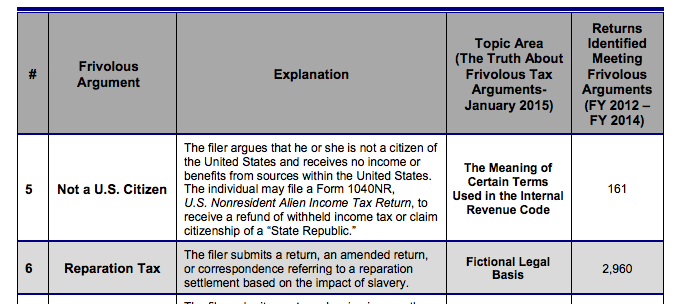Hundreds of people each year are telling the IRS they deserve a reduced tax bill because they are owed reparations for slavery, and a new government watchdog report indicates the IRS might be paying out some of those claims.
The Treasury Inspector General for Tax Administration released a report Wednesday that said the Internal Revenue Service needs to do a better job spotting “frivolous” tax arguments. TIGTA said more than 220,000 potentially frivolous tax returns were filed in fiscal year 2014 and were not detected by the IRS.
Those unreviewed returns claimed more than $260.6 million in “potentially erroneous refunds.” Of those, the IRS confirmed that nearly 2,000 of those returns made frivolous claims worth more than $27.2 million.
Some of those may have included returns claiming a reduced tax bill because of reparations for slavery. According to an appendix in the report, reparations arguments are one of the most commonly made frivolous claims.

Reparations is one of the 50 frivolous claims the IRS is watching for, and only three other frivolous claims were more frequently detected by the IRS from fiscal 2012 to fiscal 2014. Over those three years, the IRS identified 2,960 frivolous reparation claims, or about 1,000 per year.
The report didn’t make clear how many reparation claims might have been approved.
TIGTA described the reparations claims as one in which a taxpayer submits a return or other paperwork “referring to a reparation settlement based on the impact of slavery.” TIGTA said that claim has a “fictional legal basis.”
Many of the other fake claims are technical tax and legal arguments, including that certain income shouldn’t count as income, and that various amendments to the Constitution make income tax illegaly.
The report said the IRS has been unable to crackdown on these fake claims because of limited resources, an argument the IRS has been making for years in the face of Republican budget cuts to the agency.
“When we brought this to IRS management’s attention, they indicated that due to limited resources the IRS cannot review all tax returns identified as claiming a potentially frivolous argument,” TIGTA said. “As such, the IRS uses dollar tolerances to help ensure that its limited resources are used to review those claims that will result in the highest potential return on investment.”
TIGTA recommended that the IRS do a better job to stop frivolous returns from being processed, and that IRS agreed that all refunds and credits would be reviewed, regardless of the dollar amounts.
